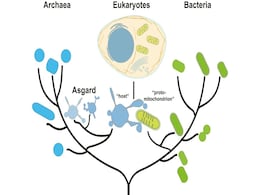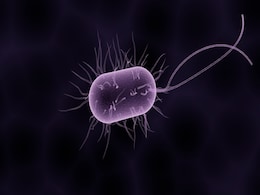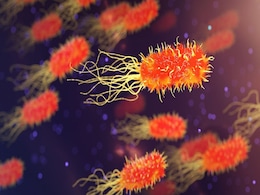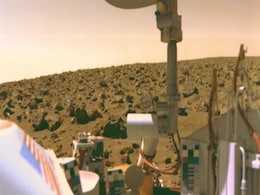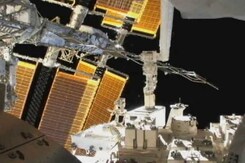Microbe
- All
- News
- Videos
-

Asgard Archaea May Hold the Key to the Origins of Eukaryotic Life, New Study Suggests
- Thursday March 27, 2025
- Written by Gadgets 360 Staff
Asgard archaea, a group of single-celled organisms, may hold clues to the evolution of eukaryotic cells. Researchers at ETH Zurich have identified cytoskeletal proteins similar to those in eukaryotes, challenging the traditional three-domain model of life. Their findings suggest these microbes might have enabled key interactions that led to complex...
-
 www.gadgets360.com
www.gadgets360.com
-

Life on Mars? Studies Suggest Bacteria-Like Organisms Could Exist
- Thursday March 13, 2025
- Written by Gadgets 360 Staff
New findings indicate that Mars' past conditions may have supported microbial life. Research draws parallels with extremophiles—microorganisms that thrive in extreme environments on Earth. Studies on bacteria like Helicobacter pylori suggest that if life exists on Mars, it might resemble resilient microbes found in human stomachs. Scientists cont...
-
 www.gadgets360.com
www.gadgets360.com
-

Scientists Find Wastewater Bacteria That Break Down PET Plastic, Aiding Pollution Control
- Thursday February 27, 2025
- Written by Gadgets 360 Staff
Research has revealed that bacteria commonly found in wastewater can break down PET plastic, a widely used material in bottles and textiles. Scientists identified a specific enzyme responsible for degrading the plastic into smaller particles. While experts see promise in this discovery, concerns remain about its scalability for tackling large-scale...
-
 www.gadgets360.com
www.gadgets360.com
-

Can Dogs Help Improve Your Baby's Immune System?
- Friday February 21, 2025
- Aayushi Singh Chauhan
The presence of pets introduces babies to a diverse range of microbes, promoting a stronger and more resilient immune system. But how exactly can dogs help improve your baby's immune system? Let's explore the science behind it.
-
 doctor.ndtv.com
doctor.ndtv.com
-

Microbes Uncovered in Amazon Peatlands Could Alter Global Carbon Dynamics
- Wednesday January 29, 2025
- Written by Gadgets 360 Staff
Microscopic organisms found in the tropical peatlands of Peru’s northwestern Amazon are helping regulate the carbon cycle, a key factor in Earth’s climate. These microbes, part of the Bathyarchaeia group, thrive in waterlogged, oxygen-deprived conditions and exhibit unique metabolic behaviours that either store or release carbon. Researchers wa...
-
 www.gadgets360.com
www.gadgets360.com
-

Mutant Cyanobacterium Chonkus Could Help Combat Climate Change with Carbon Storage
- Wednesday January 29, 2025
- Written by Gadgets 360 Staff
Chonkus, a mutant strain of cyanobacterium, has been found to store more carbon and sink faster than typical strains. Discovered by Max Schubert and his team at the Wyss Institute, this microbe could assist in carbon sequestration efforts. Chonkus' quick sinking ability and high carbon storage capacity suggest it may play a role in reducing atmosph...
-
 www.gadgets360.com
www.gadgets360.com
-

Lake Mendota's Bacteria Are Stuck in an Evolutionary Loop, Finds Study
- Saturday January 4, 2025
- Written by Gadgets 360 Staff
Research in Lake Mendota reveals seasonal bacterial evolution, with microbes adapting to environmental shifts over 20 years. Despite rapid changes, many species return to prior genetic states, highlighting cyclical evolution patterns. Extreme weather events, like those seen in 2012, led to lasting genetic adaptations, offering insights into how mic...
-
 www.gadgets360.com
www.gadgets360.com
-

Mars' Hidden Methane Deposits Could Be Underneath the Crust, Host Alien Life
- Friday January 3, 2025
- Written by Gadgets 360 Staff
Scientists have identified regions on Mars where conditions might support microbial life beneath the surface. Seasonal methane variations and Earth-based studies of similar environments suggest underground habitats such as Acidalia Planitia could hold the key. Methanogens, microbes that produce methane, thrive in extreme conditions on Earth, like s...
-
 www.gadgets360.com
www.gadgets360.com
-

New Study Reveals Incredible Microbial Life Deep Under Earth’s Surface
- Thursday December 19, 2024
- Written by Gadgets 360 Staff
A groundbreaking study published in Science Advances has revealed the extensive microbial life thriving beneath Earth's surface. The research led by Emil Ruff uncovers diverse ecosystems at depths of up to 4,375 metres, challenging previous assumptions about energy limitations in deep environments. It also suggests that Earth's subsurface microbes ...
-
 www.gadgets360.com
www.gadgets360.com
-

Scientists Want 'Mirror Life' Microbe Research To Halt. Here's Why
- Saturday December 14, 2024
- World News | Edited by NDTV News Desk
Leading scientists from across the globe have suggested halting the research aimed at creating "mirror life" microbes.
-
 www.ndtv.com
www.ndtv.com
-

Dorset's Fossil Forest: A Jurassic Landscape Preserved by Microbial Fossilisation
- Monday December 9, 2024
- Written by Gadgets 360 Staff
The Fossil Forest in Dorset, England, preserves tree stumps from the late Jurassic period through unique microbial fossilisation. Found along the Jurassic Coast, these remains showcase the ancient Protocupressinoxylon cypress species and offer insight into prehistoric ecosystems. Rising sea levels submerged the forest, but microbes encased the root...
-
 www.gadgets360.com
www.gadgets360.com
-

Earth Microbes Discovered in Asteroid Ryugu Sample, Raises Contamination Concerns
- Thursday November 28, 2024
- Written by Gadgets 360 Staff
A study has confirmed that terrestrial microbes colonised a Ryugu asteroid sample after its return to Earth in 2020. The micro-organisms were found to proliferate upon exposure to Earth's atmosphere, raising concerns over contamination risks in planetary exploration. Published in Meteoritics & Planetary Science, the findings underline the need for ...
-
 www.gadgets360.com
www.gadgets360.com
-

NASA’s Viking Mission May Have Destroyed Martian Life with Water Experiments
- Tuesday November 19, 2024
- Written by Gadgets 360 Staff
In 1975, NASA’s Viking mission tested Martian soil for microbial life using liquid water. A recent theory suggests this approach may have destroyed microbes adapted to Mars' dry, salt-driven conditions. Astrobiologist Dirk Schulze-Makuch proposes revisiting our assumptions about life on Mars and prioritising methods suited to its hyperarid enviro...
-
 www.gadgets360.com
www.gadgets360.com
-

‘Chonkus’ Algae Found Off Italian Coast Holds Promise for Improve Climate Change Situation
- Monday November 11, 2024
- Written by Gadgets 360 Staff
The newly identified ‘Chonkus’ strain of cyanobacteria, discovered in Italy's volcanic waters, may be a natural ally in carbon sequestration. With its CO₂-absorbing properties and ability to thrive in extreme environments, Chonkus shows promise in industrial carbon storage and bio-manufacturing, potentially lowering costs while contributing t...
-
 www.gadgets360.com
www.gadgets360.com
-

Asgard Archaea May Hold the Key to the Origins of Eukaryotic Life, New Study Suggests
- Thursday March 27, 2025
- Written by Gadgets 360 Staff
Asgard archaea, a group of single-celled organisms, may hold clues to the evolution of eukaryotic cells. Researchers at ETH Zurich have identified cytoskeletal proteins similar to those in eukaryotes, challenging the traditional three-domain model of life. Their findings suggest these microbes might have enabled key interactions that led to complex...
-
 www.gadgets360.com
www.gadgets360.com
-

Life on Mars? Studies Suggest Bacteria-Like Organisms Could Exist
- Thursday March 13, 2025
- Written by Gadgets 360 Staff
New findings indicate that Mars' past conditions may have supported microbial life. Research draws parallels with extremophiles—microorganisms that thrive in extreme environments on Earth. Studies on bacteria like Helicobacter pylori suggest that if life exists on Mars, it might resemble resilient microbes found in human stomachs. Scientists cont...
-
 www.gadgets360.com
www.gadgets360.com
-

Scientists Find Wastewater Bacteria That Break Down PET Plastic, Aiding Pollution Control
- Thursday February 27, 2025
- Written by Gadgets 360 Staff
Research has revealed that bacteria commonly found in wastewater can break down PET plastic, a widely used material in bottles and textiles. Scientists identified a specific enzyme responsible for degrading the plastic into smaller particles. While experts see promise in this discovery, concerns remain about its scalability for tackling large-scale...
-
 www.gadgets360.com
www.gadgets360.com
-

Can Dogs Help Improve Your Baby's Immune System?
- Friday February 21, 2025
- Aayushi Singh Chauhan
The presence of pets introduces babies to a diverse range of microbes, promoting a stronger and more resilient immune system. But how exactly can dogs help improve your baby's immune system? Let's explore the science behind it.
-
 doctor.ndtv.com
doctor.ndtv.com
-

Microbes Uncovered in Amazon Peatlands Could Alter Global Carbon Dynamics
- Wednesday January 29, 2025
- Written by Gadgets 360 Staff
Microscopic organisms found in the tropical peatlands of Peru’s northwestern Amazon are helping regulate the carbon cycle, a key factor in Earth’s climate. These microbes, part of the Bathyarchaeia group, thrive in waterlogged, oxygen-deprived conditions and exhibit unique metabolic behaviours that either store or release carbon. Researchers wa...
-
 www.gadgets360.com
www.gadgets360.com
-

Mutant Cyanobacterium Chonkus Could Help Combat Climate Change with Carbon Storage
- Wednesday January 29, 2025
- Written by Gadgets 360 Staff
Chonkus, a mutant strain of cyanobacterium, has been found to store more carbon and sink faster than typical strains. Discovered by Max Schubert and his team at the Wyss Institute, this microbe could assist in carbon sequestration efforts. Chonkus' quick sinking ability and high carbon storage capacity suggest it may play a role in reducing atmosph...
-
 www.gadgets360.com
www.gadgets360.com
-

Lake Mendota's Bacteria Are Stuck in an Evolutionary Loop, Finds Study
- Saturday January 4, 2025
- Written by Gadgets 360 Staff
Research in Lake Mendota reveals seasonal bacterial evolution, with microbes adapting to environmental shifts over 20 years. Despite rapid changes, many species return to prior genetic states, highlighting cyclical evolution patterns. Extreme weather events, like those seen in 2012, led to lasting genetic adaptations, offering insights into how mic...
-
 www.gadgets360.com
www.gadgets360.com
-

Mars' Hidden Methane Deposits Could Be Underneath the Crust, Host Alien Life
- Friday January 3, 2025
- Written by Gadgets 360 Staff
Scientists have identified regions on Mars where conditions might support microbial life beneath the surface. Seasonal methane variations and Earth-based studies of similar environments suggest underground habitats such as Acidalia Planitia could hold the key. Methanogens, microbes that produce methane, thrive in extreme conditions on Earth, like s...
-
 www.gadgets360.com
www.gadgets360.com
-

New Study Reveals Incredible Microbial Life Deep Under Earth’s Surface
- Thursday December 19, 2024
- Written by Gadgets 360 Staff
A groundbreaking study published in Science Advances has revealed the extensive microbial life thriving beneath Earth's surface. The research led by Emil Ruff uncovers diverse ecosystems at depths of up to 4,375 metres, challenging previous assumptions about energy limitations in deep environments. It also suggests that Earth's subsurface microbes ...
-
 www.gadgets360.com
www.gadgets360.com
-

Scientists Want 'Mirror Life' Microbe Research To Halt. Here's Why
- Saturday December 14, 2024
- World News | Edited by NDTV News Desk
Leading scientists from across the globe have suggested halting the research aimed at creating "mirror life" microbes.
-
 www.ndtv.com
www.ndtv.com
-

Dorset's Fossil Forest: A Jurassic Landscape Preserved by Microbial Fossilisation
- Monday December 9, 2024
- Written by Gadgets 360 Staff
The Fossil Forest in Dorset, England, preserves tree stumps from the late Jurassic period through unique microbial fossilisation. Found along the Jurassic Coast, these remains showcase the ancient Protocupressinoxylon cypress species and offer insight into prehistoric ecosystems. Rising sea levels submerged the forest, but microbes encased the root...
-
 www.gadgets360.com
www.gadgets360.com
-

Earth Microbes Discovered in Asteroid Ryugu Sample, Raises Contamination Concerns
- Thursday November 28, 2024
- Written by Gadgets 360 Staff
A study has confirmed that terrestrial microbes colonised a Ryugu asteroid sample after its return to Earth in 2020. The micro-organisms were found to proliferate upon exposure to Earth's atmosphere, raising concerns over contamination risks in planetary exploration. Published in Meteoritics & Planetary Science, the findings underline the need for ...
-
 www.gadgets360.com
www.gadgets360.com
-

NASA’s Viking Mission May Have Destroyed Martian Life with Water Experiments
- Tuesday November 19, 2024
- Written by Gadgets 360 Staff
In 1975, NASA’s Viking mission tested Martian soil for microbial life using liquid water. A recent theory suggests this approach may have destroyed microbes adapted to Mars' dry, salt-driven conditions. Astrobiologist Dirk Schulze-Makuch proposes revisiting our assumptions about life on Mars and prioritising methods suited to its hyperarid enviro...
-
 www.gadgets360.com
www.gadgets360.com
-

‘Chonkus’ Algae Found Off Italian Coast Holds Promise for Improve Climate Change Situation
- Monday November 11, 2024
- Written by Gadgets 360 Staff
The newly identified ‘Chonkus’ strain of cyanobacteria, discovered in Italy's volcanic waters, may be a natural ally in carbon sequestration. With its CO₂-absorbing properties and ability to thrive in extreme environments, Chonkus shows promise in industrial carbon storage and bio-manufacturing, potentially lowering costs while contributing t...
-
 www.gadgets360.com
www.gadgets360.com

